Functions | |
| def | print_response (resp) |
| def | unknown_command (cmd) |
| def | process_set_command (parts) |
| def | process_get_command (parts) |
| def | process_delete_command (parts) |
| def | cd (new_url) |
| def | process_cd_command (parts) |
| def | process_post_command (parts) |
| def | process_create_vehicle () |
| def | process_create_experiment () |
| def | process_create_algorithm () |
| def | process_create_command (parts) |
| def | select_vehicle () |
| def | process_assign_experiment () |
| def | process_assign_algorithm () |
| def | process_assign_command (parts) |
| def | process_list_vehicles () |
| def | process_list_experiments () |
| def | process_list_algorithms () |
| def | process_list_command (parts) |
| def | process_fetch_command (parts) |
| def | parse_input (cmd) |
| def | get_cur_url () |
| def | main () |
Variables | |
| string | version_id = "v0.1" |
| bool | running = True |
| string | base_url = "http://35.153.64.44:8081" |
| string | rel_url = "" |
| string | vehicles_url = "/rest/vehicles" |
| string | experiments_url = "/rest/experiments" |
| string | algorithms_url = "/rest/algorithms" |
Function Documentation
◆ cd()
| def speedharm-cli.cd | ( | new_url | ) |
Definition at line 73 of file speedharm-cli.py.
Referenced by process_cd_command().

◆ get_cur_url()
| def speedharm-cli.get_cur_url | ( | ) |
Definition at line 279 of file speedharm-cli.py.
Referenced by main(), process_delete_command(), process_get_command(), and process_post_command().

◆ main()
| def speedharm-cli.main | ( | ) |
Definition at line 282 of file speedharm-cli.py.
References get_cur_url(), main(), and parse_input().
Referenced by main().
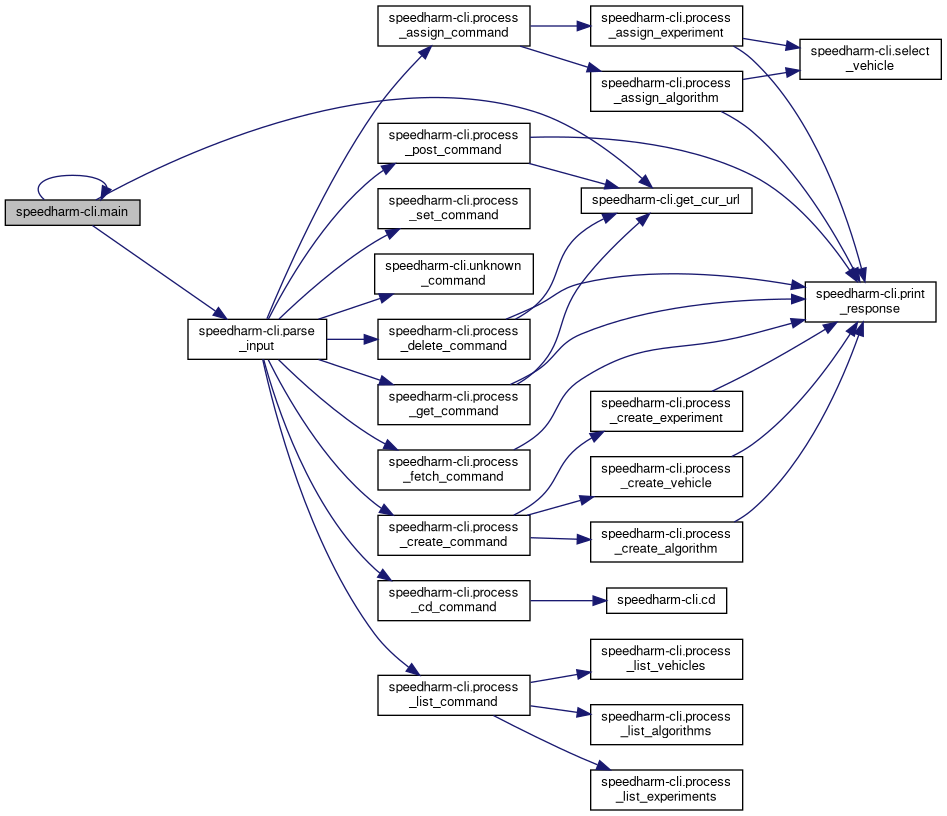

◆ parse_input()
| def speedharm-cli.parse_input | ( | cmd | ) |
Parse the command input and execute the appropriate action
Definition at line 232 of file speedharm-cli.py.
References process_assign_command(), process_cd_command(), process_create_command(), process_delete_command(), process_fetch_command(), process_get_command(), process_list_command(), process_post_command(), process_set_command(), and unknown_command().
Referenced by main().
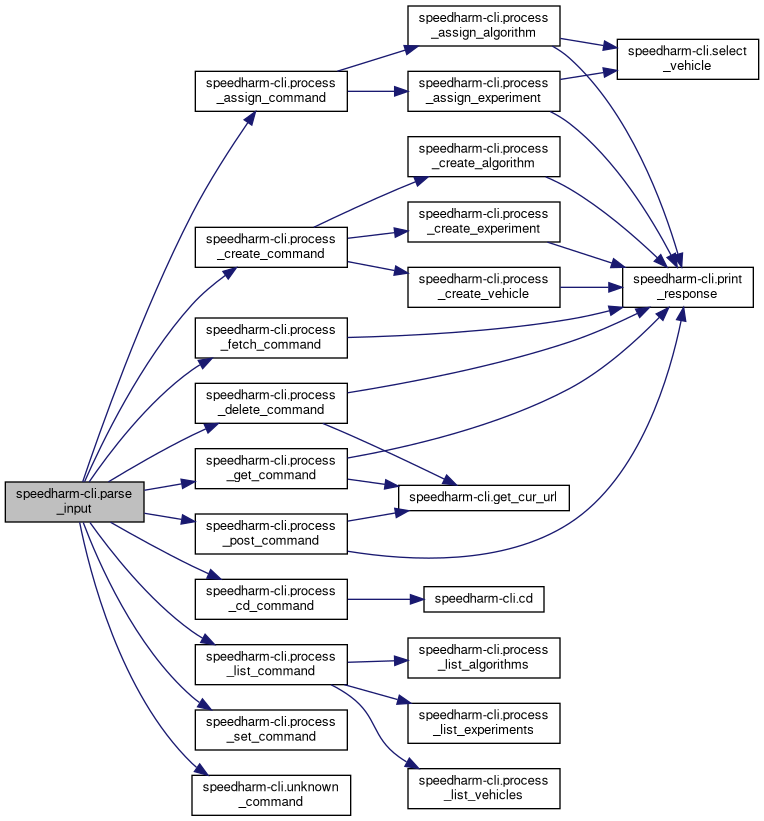

◆ print_response()
| def speedharm-cli.print_response | ( | resp | ) |
Definition at line 40 of file speedharm-cli.py.
Referenced by process_assign_algorithm(), process_assign_experiment(), process_create_algorithm(), process_create_experiment(), process_create_vehicle(), process_delete_command(), process_fetch_command(), process_get_command(), and process_post_command().
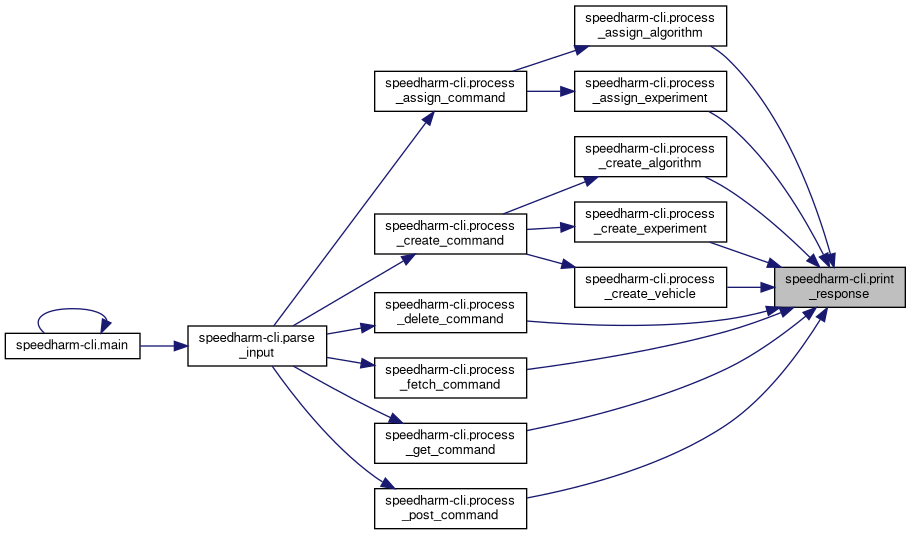
◆ process_assign_algorithm()
| def speedharm-cli.process_assign_algorithm | ( | ) |
Definition at line 162 of file speedharm-cli.py.
References create_two_lane_map.int, print_response(), and select_vehicle().
Referenced by process_assign_command().


◆ process_assign_command()
| def speedharm-cli.process_assign_command | ( | parts | ) |
Definition at line 178 of file speedharm-cli.py.
References process_assign_algorithm(), and process_assign_experiment().
Referenced by parse_input().


◆ process_assign_experiment()
| def speedharm-cli.process_assign_experiment | ( | ) |
Definition at line 146 of file speedharm-cli.py.
References create_two_lane_map.int, print_response(), and select_vehicle().
Referenced by process_assign_command().


◆ process_cd_command()
| def speedharm-cli.process_cd_command | ( | parts | ) |
Definition at line 77 of file speedharm-cli.py.
References cd().
Referenced by parse_input().


◆ process_create_algorithm()
| def speedharm-cli.process_create_algorithm | ( | ) |
Definition at line 110 of file speedharm-cli.py.
References print_response().
Referenced by process_create_command().


◆ process_create_command()
| def speedharm-cli.process_create_command | ( | parts | ) |
Definition at line 127 of file speedharm-cli.py.
References process_create_algorithm(), process_create_experiment(), and process_create_vehicle().
Referenced by parse_input().
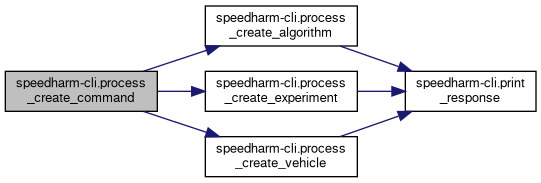

◆ process_create_experiment()
| def speedharm-cli.process_create_experiment | ( | ) |
Definition at line 102 of file speedharm-cli.py.
References print_response().
Referenced by process_create_command().


◆ process_create_vehicle()
| def speedharm-cli.process_create_vehicle | ( | ) |
Definition at line 94 of file speedharm-cli.py.
References print_response().
Referenced by process_create_command().


◆ process_delete_command()
| def speedharm-cli.process_delete_command | ( | parts | ) |
Definition at line 63 of file speedharm-cli.py.
References get_cur_url(), and print_response().
Referenced by parse_input().


◆ process_fetch_command()
| def speedharm-cli.process_fetch_command | ( | parts | ) |
Definition at line 218 of file speedharm-cli.py.
References print_response().
Referenced by parse_input().


◆ process_get_command()
| def speedharm-cli.process_get_command | ( | parts | ) |
Definition at line 54 of file speedharm-cli.py.
References get_cur_url(), and print_response().
Referenced by parse_input().


◆ process_list_algorithms()
| def speedharm-cli.process_list_algorithms | ( | ) |
Definition at line 201 of file speedharm-cli.py.
Referenced by process_list_command().

◆ process_list_command()
| def speedharm-cli.process_list_command | ( | parts | ) |
Definition at line 208 of file speedharm-cli.py.
References process_list_algorithms(), process_list_experiments(), and process_list_vehicles().
Referenced by parse_input().
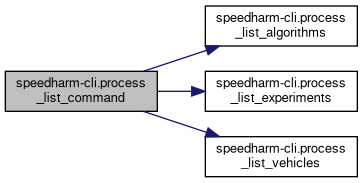

◆ process_list_experiments()
| def speedharm-cli.process_list_experiments | ( | ) |
Definition at line 194 of file speedharm-cli.py.
Referenced by process_list_command().

◆ process_list_vehicles()
| def speedharm-cli.process_list_vehicles | ( | ) |
Definition at line 187 of file speedharm-cli.py.
Referenced by process_list_command().

◆ process_post_command()
| def speedharm-cli.process_post_command | ( | parts | ) |
Definition at line 80 of file speedharm-cli.py.
References get_cur_url(), and print_response().
Referenced by parse_input().


◆ process_set_command()
| def speedharm-cli.process_set_command | ( | parts | ) |
Definition at line 51 of file speedharm-cli.py.
Referenced by parse_input().

◆ select_vehicle()
| def speedharm-cli.select_vehicle | ( | ) |
Definition at line 137 of file speedharm-cli.py.
Referenced by process_assign_algorithm(), and process_assign_experiment().

◆ unknown_command()
| def speedharm-cli.unknown_command | ( | cmd | ) |
Definition at line 48 of file speedharm-cli.py.
Referenced by parse_input().

Variable Documentation
◆ algorithms_url
| string speedharm-cli.algorithms_url = "/rest/algorithms" |
Definition at line 37 of file speedharm-cli.py.
◆ base_url
| string speedharm-cli.base_url = "http://35.153.64.44:8081" |
Definition at line 30 of file speedharm-cli.py.
◆ experiments_url
| string speedharm-cli.experiments_url = "/rest/experiments" |
Definition at line 36 of file speedharm-cli.py.
◆ rel_url
| string speedharm-cli.rel_url = "" |
Definition at line 32 of file speedharm-cli.py.
◆ running
| bool speedharm-cli.running = True |
Definition at line 29 of file speedharm-cli.py.
◆ vehicles_url
| string speedharm-cli.vehicles_url = "/rest/vehicles" |
Definition at line 35 of file speedharm-cli.py.
◆ version_id
| string speedharm-cli.version_id = "v0.1" |
Definition at line 28 of file speedharm-cli.py.